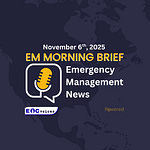The Infant Formula Problem and Emergency Management
I have talked about supply chain issues on The Todd DeVoe Show and Business Continuity Today. And When we discussed this issue, it was more about how the cost of items across the spectrum are increasing.
The other day, I was grocery shopping with my 9-year-old daughter, and she noticed that when we checked out, the baby formula was behind a locked cabinet. She is a very observant child and inquisitive. She asked me what was that and why was it protected. I told her that it was baby formula and that because it was so expensive, at times, people try to steal it.
On our way home, she contemplated that problem for a while and asked me why can't we help babies with getting the formula. I am always honest with her and explained that the government has programs. My wife is a social worker and I used her as an example of how social services work. And then we discussed Women Infant and Children (WIC) support, and more specifically how that helps with buying food for babies. She was satisfied with that answer. Until we got home.
It is strange how the world works because when we got home, the news story on TV was about the infant formula shortage and how online, private sellers are gouging prices, marketing cans for double or triple their usual price and many large retailers are sold out altogether. Then our conversation we got into was about how the supply of the formula was disrupted, which caused the price to increase and that some people cannot afford the formula and resort to thievery.
I share this story with you because the collective we (or the royal we) have decided that society will look after those in need when it comes to infants and children. That there is a role for government agencies to perform. However, in this crisis, should it be more than social services responding to the event?
Is This Crisis an Emergency?
This got me thinking about how as emergency managers, how do we look at each crisis that comes across our news wire. I am not arguing that we need to have emergency management involved in the supply chain crisis or even the issues of the formula shortage. However, the formula problem can become, and I might say, is a true health care crisis for the poor and women and children on the margins.
How did This Crisis Start?
Let's first explore how the formula shortage began. As I stated, the ongoing supply chain disruptions have been the cause of shortages of a wide range of consumer goods. In February, the current lack of baby formula became worse after manufacturer Abbott issued a recall for products made at a Michigan plant and sold under the Similac, Alimentum, and EleCare labels.
The reason for the recall call Four children — one in Minnesota, one in Texas, and two in Ohio — fell ill with bacterial infections, and two died. The deaths of the infants, caused the FDA to shut the factory down.
What is the impact of the shutdown?
The states seeing the worst shortages include Texas, Tennessee, Missouri, Iowa, North Dakota, and South Dakota — all with out-of-stock rates of about 50 percent. A total of 26 states have out-of-stock rates of 40 to 50 percent.
San Antonio's out-of-stock rate has climbed to 57 percent among metro areas, with Memphis and Nashville at 52 percent and Houston and Des Moines at 50 percent.
According to news reports, Abbot is working to address the issues and resume production of infant formula products. Brian Dittmeier, senior director of public policy at the National WIC Association stated that Abbott is the exclusive supplier for more than half the nation's WIC agencies, through which more than 1.2 million infants receive formula benefits, Dittmeier said. Such benefits are typically limited to various formulas, but agencies have waived some requirements to give families more flexibility during the shortage.
Formula Has Become A Public Policy Issue
Why is this critical for public officials to aggressively address this shortage? Because infant formula recall is having severe issues for babies and could lead to additional health problems in the future. Dittmeier said that the National WIC Association has been sounding the alarm about "risky behaviors" amplified on social media, "including the use of homemade formulas, diluting infant formula, consuming recalled formula products, or introducing cow's milk earlier than recommended."
With the trust of the national government at an all-time low, the formula shortage is causing additional concern about how government agencies are prepared to deal with any crisis.
Resources:
https://www.nytimes.com/2022/05/10/us/baby-formula-shortage.html
https://www.pewresearch.org/politics/2021/05/17/public-trust-in-government-1958-2021/
Podcasts
The Todd De Voe Show
Ask Todd, Explore Insightful and Humble Answers to Life’s Questions
Todd DeVoe shares his perspective on the questions that we all have asked ourselves. The only thing I know is that I know nothing This statement is known as the Socratic Paradox. True wisdom comes to each of us when we realize how little we understand about life, ourselves, and the world around us. So let’s dive into the questions and have a great conversation.
prepare. respond. recover
Keeping Your Business Valuable During a Crisis, Why Planning Matters
For our first episode, we welcome Ambi Silk, Director, Governance, Risk & Compliance, and Mohinder Kainth, Senior Global Risk Consultant both from CyberCX. CyberCX provides business continuity services for a range of global clients including RELX and its exhibitions subsidiary Reed Exhibitions, host of this podcast. Ambi and Mohinder dive into a range of topics including the current COVID-19 pandemic, supply chain management, the importance of the “pivot”, risk management for your staff in the office or working from home, and more. The episode wraps up with the importance of a robust incident management plan using the real-life example of when Reed Exhibitions employees were in Las Vegas for one of RX’s largest trade shows during the 2017 mass shooting.
Business Continuity Today
Why Fire Drills Are Critical
What do you do after your emergency procedures and evacuation plans are complete? It is time to exercise them. Your team must know what to do in an emergency at work and home. And How you are going to communicate with them. A vital part of this training is a fire drill, which puts the emergency procedures into practice to see if they work. If they don’t work, and there is a fire, it can have devastating consequences. Fire drills are often perceived as an unnecessary nuisance and disturbance, but they are critical in safety plans.
What To Read
Insights into the Emergency Management Hiring Process
Part 2: Tips for New and Aspiring Emergency Managers
By: Tobias Watson
I sought to gather information for Aspiring and New Emergency Managers. I asked a series of questions aimed at hiring managers to understand their evaluation criteria so I could help educate others on how to leverage themselves better in the hiring process.
Emergency Management: Is It The Hero or the Villian?
By: Todd T. DeVoe
The profession of emergency management is evolving. We are moving away from the lights and sirens of public safety and expanding the idea of what emergency management ought to be.
When we talk about Emergency Management, what are we talking about? What does this emergency management system look like to the public we serve? Emergency management is changing, and it is time we challenge the current leaders in the profession to grow.
The Crisis Response Journal
Disasters are the new business as usual
Avnesh Ratnanesan and Derrick Tin contend that disasters are fast becoming the new normal or business as usual (BAU) in the corporate world and suggest ways that future preparedness might be enhanced
Supply Chain Chaos Continues
Bill Peterson takes a closer look at the conditions and factors that continue to cause supply chain challenges and offers a view of what might be in store in the months – and possibly years – to come













